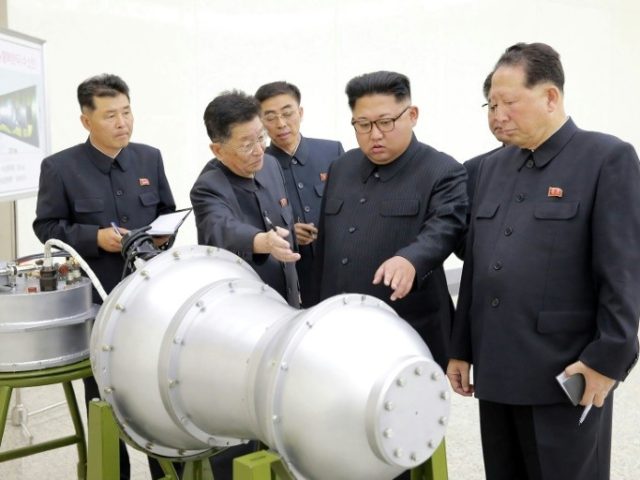South Korea’s special representative for Korean Peninsula peace and security affairs is scheduled to meet Chinese nuclear envoy Kong Xuanyou on Friday to discuss de-escalating tensions with North Korea.
The meeting follows an invitation by the left-wing South Korean government to Kim Jong-un’s communist regime to discuss, among other things, reducing threats to South Korea and North Korea’s potential participation in the upcoming Winter Olympics hosted in PyeongChang, South Korea.
South Korean news service Yonhap reported on Thursday that China will send Kong to Seoul “as part of efforts to beef up strategic communication regarding the North’s nuclear problem in line with the agreement reached at a summit between the two countries last year,” according to the South Korean foreign ministry.
A spokesman confirmed that the two will share an “in-depth discussion on the direction of their future plans.”
Chinese foreign ministry spokesman Geng Shuang issued a similar statement in his regular briefing Thursday.
“It serves the interests of the DPRK and ROK to improve ties through dialogue and promote reconciliation and cooperation,” Geng said. “It is also conducive to alleviating the tension on the Korean Peninsula, achieving denuclearization and maintaining peace, stability and security of the region.”
China is North Korea’s largest trading partner and economic relations with Beijing represented over 90 percent of North Korea’s trade in 2016. While China has claimed to support multilateral sanctions against the rogue communist regime through the United Nations, American President Donald Trump has accused China of continuing to conduct illegal business with Pyongyang.
Writing on Twitter last week, Trump said, “Caught RED HANDED—very disappointed that China is allowing oil to go into North Korea. There will never be a friendly solution to the North Korea problem if this continues to happen!”
South Korean law enforcement confirmed that they had seized a Hong Kong-flagged ship accused of shipping 600 tons of petroleum to North Korea, flouting U.N. sanctions. The Chinese foreign ministry denied having any information on the report.
In addition to maintaining ties with North Korea, Xi Jinping as endeavored to bring leftist South Korean President Moon Jae-in closer into his orbit. Moon visited Beijing in December, where he said he sought “to solidify the foundation for a new era in the relationship between the two countries based on trust and friendship between us two leaders.” Moon has proposed to use athletic exchanges to soften the Kim regime, as well as proposed the idea of having the Vatican mediate talks between the two countries.
Most recently, this week, Moon announced that he would suspend joint military exercises with the United States during the Winter Olympics and his government confirmed the use of a hotline to North Korea for the first time in two years. Pyongyang reportedly made the first call south.
The impetus for these talks was an extensive New Year’s speech by Kim Jong-un in which he appeared to call for an attempt to engage in diplomatic relations with South Korea, while boasting that he has a nuclear button on his desk to use against the United States at any time.
President Trump responded by tweeting that his nuclear button is “bigger” than Kim’s.
The head of U.S. Forces Korea (USFK), Gen. Vincent K. Brooks, warned Seoul to be wary of any apparent thaws in the relationship with the Kim regime.
“We can be generally pleased by the recent overtures that happened. But we must keep our expectations at the appropriate level,” he said.
The Chinese government, meanwhile, expressed optimism at the shift in tone this week. “China welcomes the recent concrete efforts made by the DPRK and the ROK, hopes the international community will support this and encourages all relevant parties to do more to ease tension and enhance mutual trust,” foreign ministry spokesman Geng said on Wednesday.

COMMENTS
Please let us know if you're having issues with commenting.